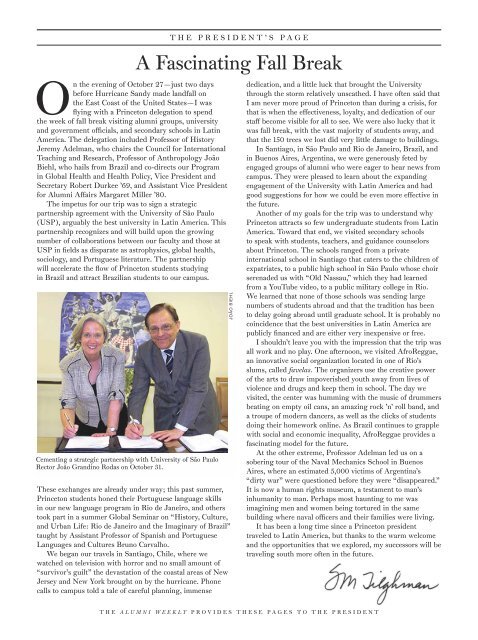Musical machines - Princeton Alumni Weekly - Princeton University
Musical machines - Princeton Alumni Weekly - Princeton University
Musical machines - Princeton Alumni Weekly - Princeton University
You also want an ePaper? Increase the reach of your titles
YUMPU automatically turns print PDFs into web optimized ePapers that Google loves.
O<br />
n the evening of October 27—just two days<br />
before Hurricane Sandy made landfall on<br />
the East Coast of the United States—I was<br />
flying with a <strong>Princeton</strong> delegation to spend<br />
the week of fall break visiting alumni groups, university<br />
and government officials, and secondary schools in Latin<br />
America. The delegation included Professor of History<br />
Jeremy Adelman, who chairs the Council for International<br />
Teaching and Research, Professor of Anthropology João<br />
Biehl, who hails from Brazil and co-directs our Program<br />
in Global Health and Health Policy, Vice President and<br />
Secretary Robert Durkee ’69, and Assistant Vice President<br />
for <strong>Alumni</strong> Affairs Margaret Miller ’80.<br />
The impetus for our trip was to sign a strategic<br />
partnership agreement with the <strong>University</strong> of São Paulo<br />
(USP), arguably the best university in Latin America. This<br />
partnership recognizes and will build upon the growing<br />
number of collaborations between our faculty and those at<br />
USP in fields as disparate as astrophysics, global health,<br />
sociology, and Portuguese literature. The partnership<br />
will accelerate the flow of <strong>Princeton</strong> students studying<br />
in Brazil and attract Brazilian students to our campus.<br />
Cementing a strategic partnership with <strong>University</strong> of São Paulo<br />
Rector João Grandino Rodas on October 31.<br />
These exchanges are already under way; this past summer,<br />
<strong>Princeton</strong> students honed their Portuguese language skills<br />
in our new language program in Rio de Janeiro, and others<br />
took part in a summer Global Seminar on “History, Culture,<br />
and Urban Life: Rio de Janeiro and the Imaginary of Brazil”<br />
taught by Assistant Professor of Spanish and Portuguese<br />
Languages and Cultures Bruno Carvalho.<br />
We began our travels in Santiago, Chile, where we<br />
watched on television with horror and no small amount of<br />
“survivor’s guilt” the devastation of the coastal areas of New<br />
Jersey and New York brought on by the hurricane. Phone<br />
calls to campus told a tale of careful planning, immense<br />
THE PRESIDENT’S PAGE<br />
A Fascinating Fall Break<br />
JOÃO BIEHL<br />
dedication, and a little luck that brought the <strong>University</strong><br />
through the storm relatively unscathed. I have often said that<br />
I am never more proud of <strong>Princeton</strong> than during a crisis, for<br />
that is when the effectiveness, loyalty, and dedication of our<br />
staff become visible for all to see. We were also lucky that it<br />
was fall break, with the vast majority of students away, and<br />
that the 150 trees we lost did very little damage to buildings.<br />
In Santiago, in São Paulo and Rio de Janeiro, Brazil, and<br />
in Buenos Aires, Argentina, we were generously feted by<br />
engaged groups of alumni who were eager to hear news from<br />
campus. They were pleased to learn about the expanding<br />
engagement of the <strong>University</strong> with Latin America and had<br />
good suggestions for how we could be even more effective in<br />
the future.<br />
Another of my goals for the trip was to understand why<br />
<strong>Princeton</strong> attracts so few undergraduate students from Latin<br />
America. Toward that end, we visited secondary schools<br />
to speak with students, teachers, and guidance counselors<br />
about <strong>Princeton</strong>. The schools ranged from a private<br />
international school in Santiago that caters to the children of<br />
expatriates, to a public high school in São Paulo whose choir<br />
serenaded us with “Old Nassau,” which they had learned<br />
from a YouTube video, to a public military college in Rio.<br />
We learned that none of those schools was sending large<br />
numbers of students abroad and that the tradition has been<br />
to delay going abroad until graduate school. It is probably no<br />
coincidence that the best universities in Latin America are<br />
publicly financed and are either very inexpensive or free.<br />
I shouldn’t leave you with the impression that the trip was<br />
all work and no play. One afternoon, we visited AfroReggae,<br />
an innovative social organization located in one of Rio’s<br />
slums, called favelas. The organizers use the creative power<br />
of the arts to draw impoverished youth away from lives of<br />
violence and drugs and keep them in school. The day we<br />
visited, the center was humming with the music of drummers<br />
beating on empty oil cans, an amazing rock ’n’ roll band, and<br />
a troupe of modern dancers, as well as the clicks of students<br />
doing their homework online. As Brazil continues to grapple<br />
with social and economic inequality, AfroReggae provides a<br />
fascinating model for the future.<br />
At the other extreme, Professor Adelman led us on a<br />
sobering tour of the Naval Mechanics School in Buenos<br />
Aires, where an estimated 5,000 victims of Argentina’s<br />
“dirty war” were questioned before they were “disappeared.”<br />
It is now a human rights museum, a testament to man’s<br />
inhumanity to man. Perhaps most haunting to me was<br />
imagining men and women being tortured in the same<br />
building where naval officers and their families were living.<br />
It has been a long time since a <strong>Princeton</strong> president<br />
traveled to Latin America, but thanks to the warm welcome<br />
and the opportunities that we explored, my successors will be<br />
traveling south more often in the future.<br />
THE ALUMNI WEEKLY PROVIDES THESE PAGES TO THE PRESIDENT


